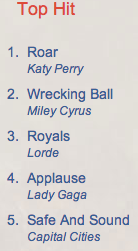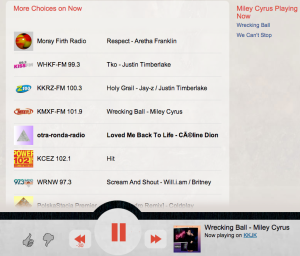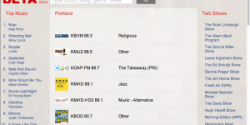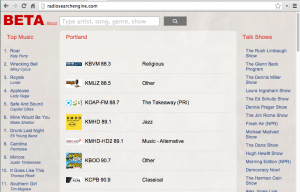I spent several fun hours testing RSE and surfing radio from around the world with ease. The site delivers on music search results for songs, artists and, to some extent, genres, that are playing on just about any station streaming on the internet. This happens with a surprising quickness and smoothness, especially considering it’s in beta. RSE updates results dynamically on your screen as songs start and end somewhere in internet radio land, lowering your chance of clicking a song that’s ended. The app’s interface is straightforward and pretty easy to use, if spare. But that means it generally doesn’t get in the way of starting to listen right away.
As a huge radio nerd I had a blast jumping from song to song, station to station, country to country. Despite how cool it is, I’m not yet certain it delivers a complete enough experience for the average music or radio listener. As a result it may not be ready to take on Clear Channel’s attempt to be radio’s Google. Read on for more.
Ten Songs, Thousands of Stations
 But first, if there’s one thing that using RSE will do, it’s confirm the belief that too many radio stations all play the same songs, over and over. Of course that’s not RSE’s fault. The site is just harvesting tons of metadata from the live streams of radio stations across the world and across the internet to deliver a surprisingly responsive and reasonably accurate searchable database of the songs and programs that are airing live right this moment. Then you’re just a click away from hearing that song, artist or show, provided it is actually airing somewhere now.
But first, if there’s one thing that using RSE will do, it’s confirm the belief that too many radio stations all play the same songs, over and over. Of course that’s not RSE’s fault. The site is just harvesting tons of metadata from the live streams of radio stations across the world and across the internet to deliver a surprisingly responsive and reasonably accurate searchable database of the songs and programs that are airing live right this moment. Then you’re just a click away from hearing that song, artist or show, provided it is actually airing somewhere now.
That, in and of itself, is impressive, even if I don’t like what it means about the profound lack of creativity in radio programming.
If you’re interested in the top hits of today, you’ve got a high likelihood of hearing your choice without delay. Robertson says “tens of thousands of stations are scanned every 3–5 seconds to get the currently playing song.” When I was testing out RSE its “top hit” song was “Roar” by Katy Perry. Clicking the song immediately brought up a stream from KKLS-FM. Selecting the #2 song, Miley Cyrus’ “Wrecking Ball” also came up nearly instantaneously, this time from KEGY-FM.
Vividly demonstrating the meaning of “heavy rotation,” clicking through the top 10 hits brought up each song pretty much right away. Hits 11 – 20 did not necessarily come up so quickly, obviously owing to the fact that they’re not played quite as wall-to-wall as songs 1 to 10. But I didn’t have to wait long to find most of these tracks playing somewhere.
This pattern held pretty well true for the top tracks in other genres like “Rock” and “Oldies,” though only the top few songs were as ubiquitous as the top 10 pop songs. Also, I find RSE’s genre categories to be too broad, and not matching well with established radio formats. For instance, the site doesn’t seem to distinguish between newer, so called “active rock” and “classic rock.” A listener with a jones for popular metal band Avenged Sevenfold very well may not have a taste for Lynyrd Skynyrd or Billy Idol as RSE would suggest.
Radio Search Engine Starts Local
When you fire up RSE for the first time it takes you to a list of stations in your local market, each showing the program or song that’s playing now. If RSE doesn’t know the program or track it displays the station’s format. Since I’m in Portland, Oregon, I saw the stations in my market, both FM and AM. The station list for FM was pretty accurate for the main analog or HD–1 signal, but only one secondary HD2 signal was listed–KHME HD2–though I know there are many more HD2 stations than that.
Both the station listing and now playing data for the AM band was less accurate. One station, KMTT-AM flipped format on November 1, so it’s understandable that it would still be listed as the former alternative rock format. But the show information for two other stations was wrong, too. I clicked on KPAM-AM to hear Dennis Miller but got Dave Ramsey instead. Selecting the Dave Ramsey show on KEX-AM delivered local host Michael Berry instead. Checking both stations’ websites showed accurate schedules for what I heard.
I did not run into these kinds of errors for music stations. I suspect that’s because talk and non-music stations don’t necessarily include the same program metadata, which means RSE would need to rely on schedules obtained from websites or other sources.
Click, Play, More Choices on Now
 You start listening by clicking on either one of the stations listed in the center column or one of the top tracks listed on the left of the screen. By default the top tracks you see first are labeled “top music,” which looks like the top songs played across all stations, genres and formats. If you click on a song that isn’t playing now RSE offers up a list of stations “likely to play it soon” in the center of the interface. If other songs by that artist are being played on another station they’re listed on the right-hand side.
You start listening by clicking on either one of the stations listed in the center column or one of the top tracks listed on the left of the screen. By default the top tracks you see first are labeled “top music,” which looks like the top songs played across all stations, genres and formats. If you click on a song that isn’t playing now RSE offers up a list of stations “likely to play it soon” in the center of the interface. If other songs by that artist are being played on another station they’re listed on the right-hand side.
Selecting a song that is live, sometimes the song would be just ending, or a station’s stream seemed to fail. But with the popular tracks reclicking on the song once or twice would shunt me to another station playing the same track. These sorts of glitches are not necessarily RSE’s fault. For timing the search engine has to rely upon a station’s metadata being accurate to the minute or second. My experience with streams is that the track information can often be seconds to as much as a half-minute delayed from when the song actually starts. As well, RSE has no control over any station’s stream being up and functioning correctly.
Your selected stream is displayed in a player at the bottom of the screen, showing a conventional player interface along with artist, track, station and an album thumbnail, if available. There are also the now-ubiquitous thumbs-up and thumbs-down icons to tell RSE how you feel about the track. If you click thumbs-down the track stops and another one is delivered, generally from a station of the same format or genre.
The center column of the interface displays “More Choices Now,” which is a list of stations playing songs in the same genre as what’s playing now (cribbed from Robertson’s UberStations site–more on that in a bit). I was impressed by the fact that this list refreshes automatically as songs end and new songs start somewhere on the internet. If you click the thumbs-up icon in the player it refreshes this list. I’m not sure it does anything else.
The “More Choices Now” accuracy to genre was all over the map, in my experience. Popular songs from popular artists seem to generate the most accurate suggestions. But when I listened to “Moving in Stereo” a moody synth-heavy track by 80s pop new wave band The Cars, suggestions included Katy Perry, indie rock band White Denim, electronic artist Strip Steve and, most curiously, the country song “Wagon Wheel” by Darius Rucker. Then clicking on “Wagon Wheel” brought up quite a few pop country hits from the likes of Keith Urban and Tim McGraw, but also pop singer Lana Del Rey and the French electronic band Phoenix. But listening to 90s alternative hit “1979” by The Smashing Pumpkins served up a nice selection of other alt rock hits that would all segue nicely.
Music Search Is its Strength
As its name implies, you can search for artists, songs, tracks, genres or shows and then listen if they’re on. RSE is very good at delivering results for artists and songs, with a deep inventory of even obscure artists in its database. Searching on genres was less impressive, often only delivering online-only stations with the genre explicitly in its name, such as “GothVille Radio” for “goth.” Broader, less obscure genres like “jazz” delivered better results, hewing to the actual genres of tracks, not just the station or program. But a sub-genre like “avant grade jazz” resulted in a less successful search.
Searching for talk shows works reasonably well, too, putting aside the problems I had trying to listen to talk shows on Portland AM stations. If you listen to a talk show RSE suggests other talk shows that are on now.
RSE also delivers podcasts, but I found that functionality to be spotty. Listening to the enormously popular Adam Carolla Show was no problem, but I was unable to come up with the also popular WTF with Marc Maron at all. Strangely enough, the Ihnatko Almanac podcast came up as a suggestion when I was listening to a song, but the podcast failed to play, crashing the player.
Made for Surfing
RadioSearchEngine is truly made for surfing radio stations like surfing the web, making it easier than just about any other radio listening platform I’ve used to come up with far-flung stations and interesting artists from other countries that are working in a genre you like. It’s a always an odd, but fun, experience when listening to Katy Perry on a station in Bern, Switzerland, or having one of her songs lead me to Italian pop singer Laura Pausini singing her hit “Se Non Te” on Radio Manila. And, frankly, except for the fact that it’s in Italian, that song would sound perfectly at home next to Katy Perry on any American pop station.
In this way RSE is a very unique recommendation engine for songs, artists and stations. Unfortunately, there isn’t a way that I can see for you to bookmark stations or songs you might want to return to. There is the “thumbs up” button, but there’s no indication that it has any function like a bookmark.
Open Architecture
To his credit, Robertson has opened up RSE to outside developers via an API. It’s also easy to create links to search terms. You simply put them into the URL. So to search for the Beatles your link would be http://radiosearchengine.com/search/beatles. It works the same for genres, say if you want to link to a search for country: http://radiosearchengine.com/search/country. You can even create a link that should play the BBC World Service, wherever in the world it may be on.
Radio Platforms In Search of Unity
This is the fourth online radio platform Michael Robertson has rolled out. RadioSearchEngine joins his TiVo for radio service DAR.fm and the very similar recommendation engines UberStations and UberTalk that both launched just earlier this year. These “Uber” sites have very similar functionality to RSE, though organized a little differently, and without RSE’s music-focused search.
I’m honestly a little confused by the strategy of offering four different, but somewhat overlapping radio platforms. I asked Robertson to clarify this and he explained that it’s due to being in beta. “It’s a huge undertaking to index the entire world of radio and then create a universal player, which is why nobody else does it yet.”
That’s a fair enough answer, though I don’t think that makes things any clearer to the potential user/listener. With such a general name as RadioSearchEngine I’d expect most folks would look to it to find just about anything on the radio, using it like an actual Google of radio, rather than just looking for music. I understand Robertson’s distinctions, but I’m not certain that they are useful or obvious. Instead, I suspect they’re confusing and serve as a barrier to adoption.
The real killer app would combine all four of Robertson’s radio platforms into one interface, where you can search for artists, songs, shows or stations in the same search box. In fact, that would be much more like how TiVo works for live TV, letting you search for programs, actors and channels, in addition to recording programs for viewing later.
I don’t doubt that combining DAR.fm, UberStations and UberTalk with RadioSearchEngine is a big task. But radio’s 900 lb. gorilla Clear Channel has already delivered much of this functionality with its iHeartRadio, where you can search for songs, artists and stations for instant listening. The experience isn’t as immediate or comprehensive as RadioSearchEngine, nor is the library of music and stations nearly as extensive. With iHeart you’re not getting every station on the internet, but Clear Channel is busy expanding, making deals with other broadcasters, including public and college stations.
I prefer the enormous inventory of stations and programs offered by RSE, UberStations and UberTalk, but I’m an enormous radio nerd. And so, I also suspect I’m an outlier who is much more demanding than the average iHeartRadio user. Still, it’s that potential iHeartRadio listener who Robertson needs to win over, not just the nerds like me.
If RadioSearchEngine is the Google of radio, then it’s the 2003 Google. Or, more accurately, it’s the Yahoo or Bing of radio, offering up some very good functionality, but not quite smooth enough to beat Google… or Clear Channel.




